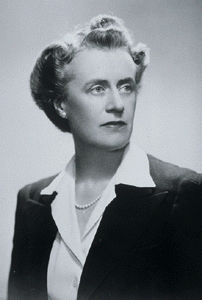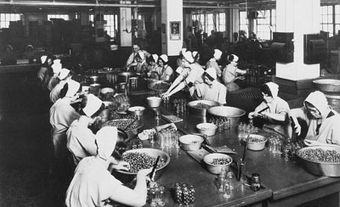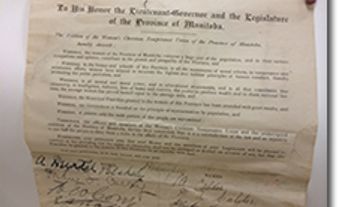
Origin of the FFQ
In the 1960s, at a time when there were few women elected to political office in Québec, women organized themselves into associations in order to put pressure on governments to defend women’s rights and interests. Thérèse Casgrain initiated a gathering of women to celebrate the 25th anniversary of women in Québec getting the right to vote, and it was in the wake of this event that the FFQ was born in 1966. It was hoped the Federation would be a powerful force that would allow women to have rights equal to those of men and that would unite women’s groups in Québec (see Women and the Law). The Federation’s founding congress was held in Montréal on 23 and 24 April 1966. Close to 400 women participated, some as individuals and others as delegates from 38 associations.

The Federation has two types of members: individuals and associations. There were 96 women who joined as individuals and 10 associations that became members in the year following the founding congress. The association members came from women’s groups or women’s committees from mixed-sex organizations, such as unions or community organizations. Among the associations were the Young Women’s Christian Association (YWCA), the Montréal and Québec City sections of the Association des Femmes diplômées d’universités du Québec(AFDU) (Association of Female University Graduates of Québec), the Cercle des femmes journalistes (Female Journalists’ Circle), the Fédération des travailleurs du Québec (FTQ) (Québec Workers’ Federation), the Montréal and Québec City branches of the Société d’étude et de conférences (Study and Conference Society), Voice of Women, the Ligue des femmes du Québec (Québec Women’s League) and Loisirs Saint-Urbain (Saint-Urbain Recreation Association).
At the beginning of the 1980s, more than 30 associations were members of the FFQ. In 2016, there were 193 such members. This broad representation contributes to the Federation being a leader in the women’s movement in Québec.
Beginnings
The FFQ was born out of the second wave of feminism. The first wave goes back to the fight for women’s right to vote, while the second wave of feminism is associated with the resurgence of feminism in the early 1960s (see Early Women’s Movements in Canada: 1867–1960; Women’s Movements in Canada: 1960–85). That period witnessed the appearance of new feminist groups in Québec and elsewhere in the world that mobilized around demands for the right to abortion, contraception, pay equity and paid housework.
The three main areas in which the FFQ was involved were the family, paid employment and inquiries on the status of women (see the Royal Commission on the Status of Women in Canada). Very early in its history, the FFQ called for pay equity between men and women. In 1967, the first president of the FFQ, Réjane Laberge-Colas, lamented Québec’s lack of laws requiring pay equity and paid maternity leave. Stepping outside their affiliations, unionists campaigned with the FFQ to advance these files concerning women’s work.

The FFQ was part of the equality feminist movement, which called for equality for women in law and in fact. In the briefs that it submitted to municipal, provincial and federal authorities, the official line of the FFQ was based on the idea of equality between the sexes and the recognition of women’s rights that were specific to that current of feminist thought.
At the start of the 1970s, the FFQ helped establish original structures designed to achieve female representation in the Québec and federal governments: the Council on the Status of Women and the Canadian Advisory Council on the Status of Women.
Since 1975, the FFQ has had an official position on abortion. It advocates a woman’s right to choose whether or not to continue a pregnancy. In the 1980s, the Federation was a member of the Coalition québécoise pour le droit à l’avortement libre et gratuit (the Québec Coalition for the Right to Free and Accessible Abortion). The FFQ criticized Pro-Life International’s violent discourse and participated in radio and television shows on abortion. Today, the FFQ continues to pursue this battle for women’s reproductive rights to be respected.
Québec Nationalism
The FFQ describes itself as a non-partisan organization. However, it has participated in political debates concerning the constitutional future of Québec.
In its early years, the FFQ supported Canadian nationalism (see Nationalism). In 1980, during the first referendum on Québec sovereignty, FFQ president Sheila Finestone engaged publicly in the referendum debate in support of the “No” side. Along with influential members of the Federation and other federalist feminists, Finestone organized large gatherings of women who opposed Québec sovereignty, known as the “Yvette” demonstrations. This movement, which was a resounding success, is considered one of the most striking political acts of the referendum campaign and a determining factor in the victory of the “No” side on 20 May 1980.

An examination of the origins, trajectory and demands of the National Action Committee on the Status of Women (NAC) and the path it has taken shows an obvious relationship with the FFQ, which was a member at certain times in its history but withdrew at other times. Although the two organizations demonstrated jointly and fought in solidarity against specific governmental decisions, the question of Québec nationalism sometimes caused rifts between them.
In the late 1980s, the FFQ turned in favour of Québec nationalism, adopting a pro-sovereignty position for the first time in the 1990s. Initially, this was a defensive measure, as the Federation was responding to Canadian feminists in organizations like the NAC, which feared that the Meech Lake Accord (1987), which was close to being signed by the provinces and the federal government, would infringe upon women’s rights. In its November 1990 brief to the Commission on the Political and Constitutional Future of Québec, the FFQ clearly affirmed it nationalist orientation. The liberation of women became associated with the liberation of the Québec nation, which was understood as the possibility for the people of Québec to define themselves and determine their own future.
Political Activity
Beginning in the 1970s, the FFQ offered leadership training, gave introductory courses on political life and organized model parliament days. During elections, the Federation supported female candidates and questioned political parties on their priorities regarding women.

The FFQ has also served as a learning environment in which presidents, who already had a good grounding in activism, have become familiar with the political arena. Thus, for Yvette Boucher-Rousseau, Sheila Finestone, Céline Signori, Constance Middleton-Hope, Vivian Barbot and Françoise David, serving as president of the FFQ was a springboard for their political careers.

The FFQ has established many committees that have studied various issues. Concerns such as the environment, pacifism, the recognition of lesbians and women from cultural communities, globalization, prostitution, seniors, homophobia, secularism and intersectionality have been addressed by these committees, in which women learn the tools of feminist analysis and action.
Coalitions
In the 1980s, the FFQ markedly changed its discourse and actions regarding the type of feminism it championed. Discourse about women’s rights continued, but the tone became more left-wing and Marxist-leaning (see Marxism). The FFQ took up the cause of fighting social inequalities and women’s poverty. Because the Federation could not wage all the battles it considered worthwhile on its own, it joined in coalitions and street demonstrations. Thus, in 1985, the Federation collaborated with the Front de défense des non-syndiquéEs (Front for the Defence of Non-Unionized Workers) and took concrete measures to support the campaign to raise the minimum wage.
At the end of the 1980s, the FFQ worked to promote International Women’s Day, which occurs on March 8 of each year, in conjunction with the heads of the major unions in Québec that were concerned with the condition of women. This coalition, which today is called the Collectif 8 mars (March 8 Collective), produced a poster and a lapel pin, and organized and coordinated political representation activities surrounding this event. The FFQ used the day to celebrate the gains made by women and to advance specific demands.
Solidarity with Indigenous Women of Québec and Canada
In the 1970s, the FFQ criticized the unfairness of the Indian Act and demanded changes to this discriminatory piece of legislation (see Prejudice and Discrimination in Canada). With its association member Femmes autochtones du Québec (Indigenous Women of Québec), the FFQ supported the Canadian Advisory Council on the Status of Women in its work to give Indigenous women and their children back the rights they had lost. In 1985, Parliament adopted amendments to the Indian Act that permitted Indigenous women who had married non-Indigenous men to regain their status and the right to be a member of their band (see Indigenous Women’s Issues).
In October 2004, the organization Femmes autochtones du Québec, which was no longer a member of the FFQ, signed a mutual solidarity protocol with the FFQ in hopes of establishing a nation-to-nation relationship. The protocol was intended to secure the commitment to act in solidarity in respecting rights in order to transform unequal relationships. In the 2010s, the FFQ participated in the mobilization that led to the establishment of a national commission of inquiry into missing and murdered Indigenous women and girls.
The Bread and Roses March (1995)
In the 1990s, the FFQ moved closer to radical feminism. As government finances were suffering from the repercussions of the economic crisis, the FFQ reacted to the course chosen by the Québec government, which had a stated objective of reducing the deficit without showing consideration for the most disadvantaged of its citizens. The FFQ denounced the government’s neoliberalism and developed an approach that was critical of economic globalization. The Federation became engaged in the fight against poverty.
It was Françoise David, then president of the FFQ, who initiated the Bread and Roses March. Starting on 26 May 1995, three contingents of 800 women marched to Québec from Montréal, Longueuil and Rivière-du-Loup and presented the government in Québec with a series of demands aimed at reducing poverty. The Bread and Roses March benefitted from genuine popular support and good coverage by the media. When it ended on 4 June 1995, Jacques Parizeau, then premier of Québec, welcomed the marchers in front of the National Assembly. Four months after the second referendum on Québec sovereignty was held, the government responded favourably to many of the demands, which included substantially increasing the minimum wage, adopting laws on pay equity and providing for automated alimony collection.
The World March of Women (2000)
In the 2000s, the FFQ used its resources to oppose violence against women. It participated in events such as the annual 12 days of action for the elimination of violence against women and it campaigned for the maintenance of the Canadian Firearms Registry (see Gun Control).
The FFQ also worked toward better redistribution of wealth. It mobilized against government divestment and campaigned as part of the Coalition Against User Fees and Privatization (of public utilities) and the Collective for a Poverty-Free Québec.
It was during the Bread and Roses March that the idea to hold a world march of women to kick off the twenty-first century was born. The FFQ contributed to the formation of the National Coalition of Women Against Poverty and Violence, which is responsible for the organization of the march in Québec. A Canadian march committee and an international liaison committee were also created.
In the 2000s, the FFQ saw its solidarity become transnational: alliances with women’s groups from various countries were formed. The World March of Women enabled hundreds of feminist organizations to share their experiences and aspirations. Together, they formulated a platform of demands under two main themes: the fight against poverty and the condemnation of violence against women. Their strategy was to negotiate with the governments of the various countries involved in order to elicit positive responses to women’s demands. Starting on 8 March 2000, women in almost 6,000 groups from 161 countries marched throughout the world. The major joint marches occurred from 15 to 17 October. At the end of the march in Montréal, FFQ president Françoise David expressed her disappointment with the federal and provincial governments’ responses to the demands and was critical of the meagre 10 cent increase in the hourly minimum wage that had just been instituted.
On 17 October 2000, the World March of Women culminated in a peaceful demonstration in the streets of New York City. Women from a hundred countries gathered in Union Square. A delegation from the March was welcomed at United Nations Headquarters to present its demands. The delegation presented the leaders of the United Nations the five million signatures of support gathered from around the world, and it informed governments about their responsibilities regarding the violence and poverty of which women are victims.
Since then, millions of women around the world have marched against poverty and violence in other editions of the World March of Women in 2005, 2010 and 2015.

The Fight for Women’s Rights
Since its beginnings, the FFQ has criticized the programs, policies and laws adopted by governments to ensure that women are taken into consideration. It has also fought against the types of discrimination of which women are victims, through collective action, training and awareness activities, and political representation.
The FFQ is considered a reformist organization because it aims to adapt the social system rather than to transform it from top to bottom. Its mission, which was rewritten in 2015, states that “The Fédération des femmes du Québec is an independent feminist organization that works towards the transformation and elimination of sex-based social relations and relations of dominance in all areas of life, in order to foster the development of full autonomy for all women and the genuine recognition of all their contributions to society.”
See alsoWomen’s Movements in Canada.

 Share on Facebook
Share on Facebook Share on X
Share on X Share by Email
Share by Email Share on Google Classroom
Share on Google Classroom


